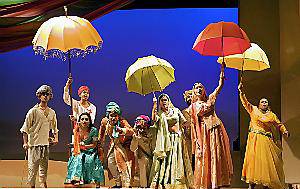Wuthering Heights given a Bollywood make-over
Reporter: Paul Genty
Date published: 16 March 2009

HOT STUFF. . . Tamasha Theatre Company’s version of Wuthering Heights at the Coliseum
WUTHERING HEIGHTS, Oldham Coliseum
HEAT, dust and sand — or at least an overly sandy-looking set — are the main features of Tamasha Theatre Company and the Coliseum’s version of the Brontë classic.
Not normal elements of the Yorkshire moors romance, perhaps, but this is the Anglo-Asian company that brought us the comedy “East is East” — which oddly also took a northern subject, Lancashire comedy, and turned it on its head.
This “Wuthering Heights” is set in Rajasthan, but apart from that the plot is remarkably similar. Elderly father treats peasant boy Krishan like a son — brother to wayward Hari and beautiful Shakuntala. When he dies, Krishan is demoted from brother to servant by the jealous Hari, and goes off to seek his fortune.
Shakuntala, meanwhile, falls for wealthy local neighbour Vijay and when Krishan returns, rich, they have been married three years. Then it all goes downhill a bit for pretty well everyone...
The actors are a generally attractive bunch: Pushpinder Chani as Krishan charms and broods on demand; Vijay (Gary Pillai) is the nice-guy who marries Shakuntala in Krishan’s absence and gets his heart broken, and the lovely Youkti Patel is the beautiful girl in the middle. Among the rest of the cast Rina Fatania as Ayah, the servant, makes an impact.
Director Kristine Landon-Smith and collaborators Felix Cross and Deepak Verma have running commentary from the older Krishan and a young street boy, which has them sitting by the front of the stage like spare chapattis at a feast for most of the evening, but in most cases, Brontë’s story transfers fairly well, the odd sandstorm standing in for Yorkshire’s weather
But then it should transfer well: “Wuthering Heights” is a story of tragic lost love: given a sensitive adaptation, it works anywhere, for any time. Here it mostly works too, but the characters aren’t very deeply drawn and the evening has a tendency to look a little unfinished and superficial. Perhaps as its tour progresses the play will attain greater dynamism.
As for the “Bollywood” angle in the advance publicity, don’t expect too much.
There are songs, all mimed to very good offstage singers, that fit into the “play with music” category, and there is a little dance, but don’t go expecting a major festival of colour and uplift: this is a romantic tragedy after all.
Most Viewed News Stories
- 1A new neighbourhood on the way for Oldham?
- 2‘New’ town hall due to open to public for first time after full cost of major refurb project...
- 3Crompton House students excel again on A Level results day
- 4Part of iconic Chadderton mill complex to be transformed into warehouses
- 5Chair of Governors 'so proud' of Oldham Sixth Form College A Level results




